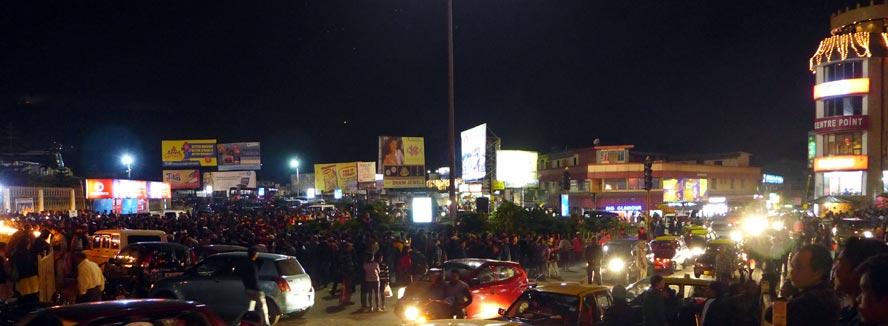The Khasi Hills Autonomous District Council's eviction of illegal traders in Shillong has earned both accolades and criticism from the public. Those who are showering praise are doing so merely out of joy as the non-tribals are targeted whereas criticism are also flowing from the same tribesmen – whose shops are let off to non-tribals – who are affected by the closure. The tribal owner is largely affected in the same way as the rented shopkeepers. So, in a way the condemnation that are flowing from so called NGOs are in reality against the tribal owners for having letting off their shops to the ‘outsiders’. But those who are praising the district council move have they ever tried to go into the real issue as to why these shops were let off by their own brethren to non-tribals.
This author is told by a number of these tribal owners that they prefer renting their business establishments to non-tribals because then they are sure of their businesses sustainability with regular incomes from them. There is a sincerity of purpose among the non-tribal traders who run their businesses with dedication. They don’t prefer tribal traders because they are erratic and because of their non-commitment they cannot pay regularly their owners. Many such tribal owners said that they have suffered in the past letting off their properties to tribal traders because they would hardly open their shops for days together, whereas no timing is maintained when they happen to open them. As a result they lost on their regular incomes. It is also a practice among other tribal businessmen here to employ non-tribal workforce because they are dutiful. So what is the NGOs really talking about here. Even their own tribesmen cannot believe or trust their own brethren when it comes to doing business or employing people. It may sound harsh but this is the true side. This is indeed a common practice that can be seen even in neighbouring Guwahati where business houses and other establishments do not prefer to employ locals. After all being a local does not guarantee one the right to work or ownership over businesses if they do not have the will and vigour. Business runs on trust, sustainability not lazily. This lethargic attitude is not going well even among fellow beings. One prime example in this regard are the big buildings coming up in every nook and corner of the town in order to extract maximum rents and live life without having much to do.
There is also some condemnation from certain NGOs that tribals are fighting for the causes of non-tribals regarding the eviction drive at Iewduh. It is unthinkable, rather what these NGOs may not have noticed, ignorantly or deliberately, that the tribal landowners came out and attack the enforcement officials for themselves because with the sealing of shops their earning has gone down drastically. It doesn’t take much of wisdom to see this simple logic. Also, when a landowner has given his premises on rent and if there is any incident then it is quite right that the landowner would come out in rescue of those whom he has given shelter. But that certainly does not mean that one has to attack others with lethal weapons and likes. The crux of the matter is that everybody is affected from these shops sealing from the shopkeeper to its owner and if anybody is trying not to see the real side of the coin then he/she is only fooling around with self. The other true side of any market, be it Iewduh, Fancy Bazar (Guwahati) and what have you, are traditionally in the hands of non-locals always. This is the dynamics of markets everywhere. This market nomenclature is in existence since the time of the Harappa and Mohenjo-Daro Civilization because a marketplace is a combination of all classes of people. If that is disturbed then it no longer remains a market.
What is absurd about the district council move is that now journalists have also been targeted for labour licences followed by porters. Since when journalists have been identified as labour, are journalists labour? Then it is high time that the district council come up with a new definition on labour. This is an insult to the profession of journalism and the worst part of this imbroglio is that no media bodies from the state so far have uttered a single voice on this matter. Their patronage cannot be misunderstood anymore. The levy of professional taxes on working journalists besides renewal of labour licence, as learnt, after every six months will have a cascading effect. This is double taxing since in one hand an employee is already paying income tax whereas with the professional tax to be levied by the district council it will certainly discourage journalists from serving in the state. It will dispirit those reputed journalists from other states who are serving here for long. Now with work contracts in few organizations, after the execution of Majithia Wage Board and double taxing, they have no other way than to return to their native. This is certainly not good news for journalism in Meghalaya which has always been on tenterhooks. Will the journalists run after his daily news or wait unendingly to obtain or renew a labour licence. With tribesmen from this region need to deal with so much in mainland and now these moves of the district council is only making things worse for their own brethren as these are spreading in various platforms, opined many right thinking Meghalayans working outside this region. This has not gone down well in the journalist fraternity in Shillong and came up for discussion at the recently held Meghalaya Editors’ and Publishers’ Association at The Shillong Club where there was a consensus that this needs to be nipped in the bud.
Another aspect is whether the eviction drive against non-tribal traders in Iewduh has any correlation with the NE tribesmen facing racial abuses in the national capital and elsewhere in the country. Well many would not think it to be so but looking at it from the angle of Newton’s Third Law of Motion which states “Every action has an equal and opposite reaction” does prove it to be true. Also from the spiritual angle which states that one has to repay one’s deed, good or bad, in this very life, proves this. So, one may feel safe now that the tribesmen from Meghalaya have not yet been targeted like their Manipuri counterparts in the national capital and elsewhere but then Newton’s Law and spiritual wisdom have not been framed out of nothing.
Meghalaya today along with few other regional states are running briskly in an opposite directionless destination. With so many parallel governments – NGOs, district councils, pressure groups, coal lobby – besides the democratically elected government, Meghalaya is a classical example of “Too many cooks spoil the broth”. It is in no way connected with the globalization. The forces of globalization are like an insect which gulps everything but is not visible to the naked eye. The only stand that states and nations can take is to keep pace with the globalization or else sync into extinction. There is no middle path here. Meghalaya today believes that it has adopted a middle path but cannot see its imminent extinction. The demand for Bengal Eastern Frontier Regulation, empowering institutions like district councils, traditional headmen, rat-hole mining and what have you here is earning deride from fellow Meghalayans in mainland who can understand where this world is moving. That such an act is detrimental for development is not in sync with the NGOs. It is something like Mizoram where someone has in the past said that they do not want development rather strict laws that thwart entry of outsiders. What would be the condition of such mindset people in this globalized era is beyond imagination, indeed.
A Shillong based author, Salil Gewali has done a beautiful compilation of quotes by famous personalities from all over the globe on Indian wisdom in a book titled, “What is India”. This book is doing wonders cutting across boundaries. Now, if somebody takes a similar initiative, say, “What is Meghalaya” then what can he jot down. Meghalaya today is in total doldrums. Here the chief minister is not seen in his office whereas the main secretariat looks more or less like a club where anyone can come and go anytime. An octogenarian resident and a former businessman from the city told this author about his good and bad experience about the main secretariat. The club like appearance of the secretariat is nothing new as learnt from him. The gentleman while narrating tales of yesteryears said that he has seen secretariat staff reaching their office at midday. After reaching immediately they take out their makeup articles from their vanity bag and refurbish their facial appearance which got tampered on the way. No sooner, tea and snacks were served and those who have brought their tiffin carrier start gulping them. After taking some rest work starts at 2pm and ends in no time as they start moving to their homes as the clock strikes 3:30pm. This is certainly the ugly side. The good side, said this gentleman, was during the tenure of chief secretary, Jaffa. Under his regime all staff used to visit their office on time and leave after the siren is blown at the State Central Library. Jaffa maintained strict vigilance on his staff and under him work flow was tremendous. But now with everything indigenous work has come to a standstill.
The Garo Hills situation is going worse day after day. There is no civil liberty as gun rule has taken over. Former Meghalaya Governor, RS Mooshahary raised his voice every now and then on his own. He even spoke in his capacity on the sidelines of public functions about his take on certain issues in the state and region at large concerning militancy. This author spoke to him on several such occasions. However, his successor is not heard or seen making any comments whereas Garo Hills has reached the pinnacle of mayhem. A former defence personnel would observe with such muteness when a region of the state where he is serving is burning every day is certainly indigestible. Though Mooshahary was from the same defence background but there is indeed a striking difference between the predecessor and the successor.
Lok Sabha MP from Shillong, Vincent H Pala moved a couple of bills in the ongoing parliament in New Delhi. He was never seen so concerned about any other issues plaguing Meghalaya that he raised them in the parliament with the aid of bills like what he has done recently. With Jaintia Hills region of the state losing its identity perhaps due to the blanket ban on rat-hole mining by National Green Tribunal and Pala’s stand in the parliament many here opined that he has actually proved that he is the MP of the coal traders. Well, he may be so but what about Wansuk Syiem, the Rajya Sabha MP. What is her contribution so far in the state except alleging that the ruling government is neglecting the region? Actually the political class here are unhappy with the drying up of central doles that were earlier flowing from the national capital without any rhyme or reason. Only a visit there was enough to bring home a basketful. But now with the Planning Commission of India yet to be commissioned by the union government, things have certainly changed for political opportunists. It is high time that legislators from mainland are made MPs here similar to what we have seen in neighbouring Assam recently and see whether they can deliver in comparison with our tribesmen.
- 8307 reads










Add new comment